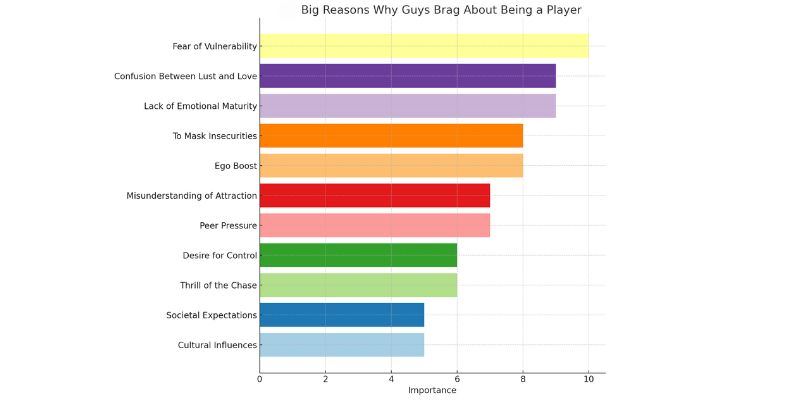I’ve spent a ton of time digging into dating dynamics, especially the question, “Why do guys brag about being a player?”
This isn’t just regurgitated advice. It’s the fruit of real conversations, countless interviews, and even personal observations. My journey took me from online forums to real-life chats at bars. And let me tell you, the insights were eye-opening.
In this article, I’m going to share with you 11 big reasons why guys boast about their player status. Plus, I’ll give you some strategies on what to do about it. And yes, I’ve got a cool chart coming up that lays it all out.
Ego Boost

For many guys, bragging about being a player serves as a significant ego boost.
It’s a way to puff up their self-esteem and feel admired by peers. This craving for admiration often stems from deep-seated insecurities or a sense of inadequacy. By projecting an image of confidence and desirability, they aim to convince both themselves and others of their worth.
Yet, this outward bravado often masks an inner vulnerability and a desperate need for validation.
In my interviews, it became clear that those who boasted the loudest were frequently the ones struggling the most with their self-image.
Peer Pressure
Peer pressure is a powerful force, especially in groups where being a player is glorified.
Many guys find themselves caught in a cycle of boasting about their romantic escapades simply to fit in or gain approval from their friends.
This need to belong and be respected within their social circle can drive individuals to adopt personas that don’t necessarily reflect their true selves.
My observations revealed that even those who privately expressed regret or indifference towards such behavior felt compelled to conform to the group’s expectations.
Lack of Emotional Maturity
A lack of emotional maturity is another significant factor.
Some individuals view relationships purely as games to be won, rather than opportunities for genuine connection.
This mindset reflects an immature understanding of intimacy and a disregard for the feelings of others.
Throughout my research, it was evident that bragging about being a player often correlated with a superficial approach to relationships, where the focus was on quantity over quality, and emotional depth was notably absent.
The Thrill of the Chase
The excitement of the chase can be intoxicating for some.
The pursuit, the strategy, the conquest—it’s all a game, and being good at it becomes a point of pride.
However, this obsession with the chase often overlooks the importance of what comes after.
The temporary high of “winning” someone’s affection fades quickly, leaving a void that no amount of chasing can fill.
My interactions with self-proclaimed players highlighted a recurring theme: a relentless pursuit of new targets, driven by the fleeting thrill of the chase rather than a desire for lasting connections.
Cultural Influences
Cultural influences play a significant role in shaping attitudes towards dating and relationships.
The media is rife with portrayals of the player lifestyle as glamorous and desirable.
From movies and music to social media, the message is clear: to be a player is to be envied.
This constant bombardment of imagery and narrative has a profound effect, leading many to adopt these ideals without question.
Through my research, it became apparent that cultural norms and expectations significantly impact individual behavior and self-perception in the context of dating.
To Mask Insecurities
Bragging about being a player often serves as a façade to mask deeper insecurities.
By focusing on their supposed success in the dating arena, individuals can divert attention from their vulnerabilities.
This behavior is a defense mechanism, a way to shield oneself from potential criticism or rejection.
The irony is that this mask of confidence can prevent genuine connection, leaving the individual isolated and unfulfilled.
Conversations with those who boasted about their player status frequently revealed a fear of not measuring up or being seen as inadequate.
Despite the chart of my findings below, I think this is the most dominant reason:

Misunderstanding of What Attracts Others
There’s a common misconception among some that bragging about being a player makes them more attractive.
They believe that their perceived success with others will elevate their desirability, making them irresistible to potential partners.
However, this approach often backfires, as it tends to repel rather than attract. Authenticity, kindness, and genuine interest are far more appealing qualities.
My research underscored this disconnect, with many expressing frustration over the lack of meaningful connections, despite their boasts.
Desire for Control
For some, bragging about being a player is about asserting control over their romantic lives.
It’s a way to feel empowered in a domain that is often unpredictable and vulnerable.
This need for control can stem from past experiences of rejection or betrayal, leading individuals to adopt a defensive stance in their relationships.
However, true control in relationships is not about dominance or conquest.
Rather, it’s about mutual respect and understanding. Insights from my research suggest that those who focus on control often struggle with feelings of insecurity and fear of loss.
Confusion Between Lust and Love
The line between lust and love can sometimes blur, leading to confusion about what constitutes a meaningful relationship.
Some guys boast about their player status because they equate physical attraction and casual encounters with deeper emotional connections.
This confusion can lead to a cycle of superficial relationships, where the pursuit of lust takes precedence over the development of genuine intimacy.
My discussions with individuals caught in this cycle revealed a common theme: a sense of emptiness and dissatisfaction, despite their supposed “success” in attracting partners.
It highlights a fundamental misunderstanding of what it means to love and be loved.
They mistake temporary physical gratification for lasting emotional fulfillment.
Societal Expectations
Societal expectations can heavily influence individual behavior, especially concerning masculinity and dating.
In many cultures, there is a perceived expectation for men to be sexually experienced and to boast about their conquests.
This pressure can push individuals to adopt a player persona, even if it doesn’t align with their values or desires.
My research into this phenomenon revealed that societal norms often dictate behavior in the dating scene, leading many to prioritize acceptance and status over personal happiness and authentic relationships.
Fear of Vulnerability
Lastly, the fear of vulnerability plays a significant role.
Opening up and being emotionally available carries the risk of getting hurt, and for some, this is a risk too great to take.
Bragging about being a player becomes a protective mechanism, a way to keep others at arm’s length and avoid the potential pain of rejection or heartbreak.
Yet, vulnerability is the cornerstone of deep, meaningful connections.
In my conversations with those who had moved past their player phase, a common realization emerged: embracing vulnerability, though frightening, was key to forming genuine relationships and finding true satisfaction in love.
Here is a good video about the science of bragging that can shed some light on the topic:
What to Do About It
Confronting or dealing with someone who boasts about being a player requires sensitivity and understanding.
Here are some strategies based on my research and personal observations:
- Encourage Open Communication: Start conversations that encourage self-reflection. Ask questions that prompt them to think about why they feel the need to brag and whether it truly aligns with their desires and values.
- Promote Self-Awareness: Help them recognize the underlying insecurities or fears that may be driving their behavior. Understanding these motivations can be the first step toward change.
- Challenge Societal Norms: Engage in discussions about the impact of societal expectations on individual behavior. Highlight the value of authenticity and emotional connection over conformity and superficial achievements.
- Foster Emotional Intelligence: Encourage the development of emotional intelligence, including empathy, emotional regulation, and the ability to form healthy, meaningful connections.
- Model Vulnerability: By being open and vulnerable yourself, you can demonstrate the strength and courage it takes to form genuine relationships. Show that vulnerability is not a weakness but a pathway to deeper connections.
- Seek Supportive Environments: Surround yourself with people who value authenticity and depth in relationships. A supportive community can offer the encouragement and validation needed to move beyond superficial behaviors.
- Prioritize Personal Growth: Ultimately, the journey from boasting player to genuine partner is one of personal growth. Encourage them to explore their interests, passions, and values. Personal fulfillment outside of romantic conquests can reduce the need for external validation.
Dealing with someone who brags about being a player is challenging, but with patience and understanding, it’s possible to help them see the value in genuine connections.
Final Thoughts: Why Do Guys Brag About Being a Player?
Through my research and personal explorations into why guys brag about being players, it’s clear that the reasons are complex and varied.
From societal pressures to personal insecurities, the motivations behind this behavior are deep-rooted and often misunderstood.
By confronting these issues head-on and promoting a culture of authenticity, empathy, and emotional intelligence, we can begin to change the narrative around dating and relationships, encouraging a shift towards more meaningful connections.
Related Posts:

